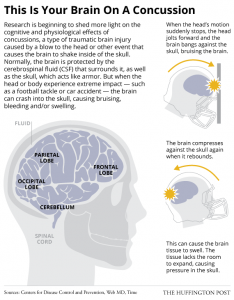For the last few years the study of athletics and concussions has focused on the long-term impact on individuals who suffer multiple incidents over their careers.
But as a Sports Psychologist, pain management specialist and head injury expert, I see patients who have symptoms of depression almost immediately after their injuries. This can be true whether they suffered a concussion on the highway during an accident or on the football field, after a particularly jarring tackle.
The difference is that until recently we never had a baseline reading of symptoms before the concussion.
Now a new study, done by a researcher at Penn State University, has confirmed what most psychologists and medical experts already know. Namely, that depressive symptoms can start to show up within days of a concussion.
In reading the article from Huffington Post, my biggest revelation was that the psychologist overseeing the study, was surprised by his results.
Anyone who has suffered from a concussion understands the psychological implications and, in hindsight, knows that the physical trauma can be a far easier recovery than the psychological recovery.
It is imperative that parents and loved ones understand this and make sure that help is provided. And by help, I do not mean simply medications which cover up the symptoms. Supportive, long-term Cognitive Behavioral Therapy is one effective method that patients can use after their injury.
In my practice I have incorporated mindfulness, visualization, EMDR, and breath work to assist with the healing process.
We’ve already seen a marked drop in participation in football, at some levels, and an increase in concussion awareness from the NFL to Pop Warner as well as other sports. But until there is an admission that psychological recovery is just as important as physical recovery the issue will not go away.
As long as teams push players to ‘tough it out’ and return to the game before their symptoms have been treated, the more long-term damage were are doing to our children and grand children.

 510-526-8524
510-526-8524
